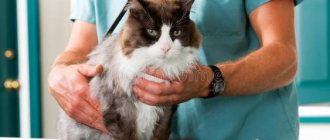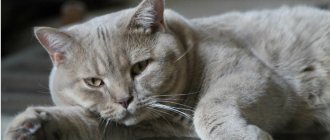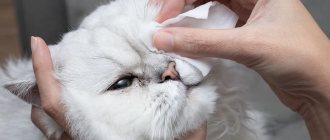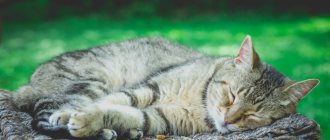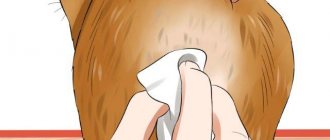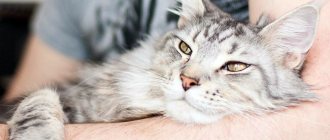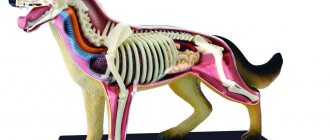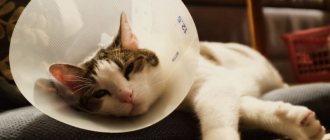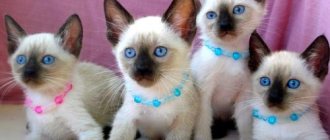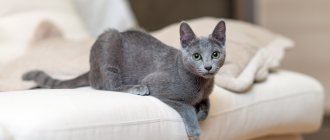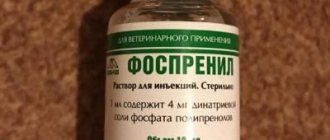Pets age much faster than we would like. Statistically, a cat over 8 years old is considered elderly; in fact, many purrs live a full life until they are 12–13 years old. Ages over 17–18 years are considered longevity. Some pets live up to 20 years. It all depends on the care, heredity and life path of the pet. Let's figure out how to care for an old cat to prolong its life.
Among cats there are also record holders for longevity. Unfortunately, there is no documentary evidence of this story, but one of the notes of an English traveler contains a very interesting story. A man writes that he found a kitten and gave it to his friend. The next meeting with a friend took place 40 years later and she appeared at the door with that same cat. A case of longevity of a cat has been officially registered in Devon (also England). An ordinary tabby cat lived there for 34 years. There are many more confirmed cases of cats living up to 20-25 years of age... which is 92-104 years of age by human standards.
Signs of aging in cats
Decreased activity.
The animal becomes less playful, sleeps more, and tries not to jump up unless absolutely necessary. Sometimes (with arthrosis) movements become constrained, the gait changes, and the springy smoothness of movements disappears. Intermittent lameness.
Decreased sensitivity of all senses.
The cat may hear worse (does not respond to a name, does not respond to the slamming of the refrigerator door). When an animal loses its vision, it is difficult for it to navigate in space and it bumps into objects. A dulled sense of smell prevents the cat from detecting food, and overall appetite decreases.
Deterioration in wool quality.
The fur stops shining and looks dull or greasy. The hairs do not adhere so tightly to each other, and bald spots may form. The wool gets tangled and falls into tangles.
Behavior change.
A cat can become either unusually affectionate (climbs on your knees, caressing you) or aggressive. Fearfulness and nervousness may appear. Feeling their own weakness, animals become cautious. In general, chronic illnesses cause severe emotional discomfort.
Keeping your pet active
The more active the cat’s lifestyle, the better the metabolism works. In addition, active cats do not have problems with joint disease. Encourage your pet to play outdoor games, use her favorite treats and interesting toys for this. Call the cat to you more often and try to entice it if it refuses outdoor games.
Providing adequate care, monitoring the pet’s condition and its balanced diet will help maintain health and increase its life expectancy. Playing together, close communication and emotional comfort will make your pet’s life safer and help prolong it as much as possible.
- Author: Elena Romanenko
Rate this article:
- 5
- 4
- 3
- 2
- 1
(9 votes, average: 5 out of 5)
Share with your friends!
Helping an aging cat
Grooming
It becomes difficult for an older cat to care for its fur. A healthy animal thoroughly washes and combs its fur with its tongue, but with pain in the spine and joints, or weak muscles, it becomes impossible to reach some areas.
The owner should comb the cat every day with a slicker brush, and also run a slightly damp grooming mitt over the fur. This will avoid the formation of tangles or at least detect them in time. If the wool has already felted, a hygienic haircut is necessary.
Inspection and nail trimming
In older animals, the change of the horny cover of the claws may be impaired, especially if the cat does not use the scratching post as actively as before. An overgrown claw bends and digs into the pad, causing severe pain and suppuration. Particularly susceptible to this problem:
- Persians;
- exotics;
- Scottish and British cats.
If the claw once digs into the pad, it will need to be trimmed regularly with a nail clipper (once every 2 weeks).
Stimulating activity
As cats age, they become increasingly less interested in their environment, preferring to lie in a warm place and doze. But to slow down muscle atrophy, aging of joints and to help the intestines work better, furry couch potatoes need to move.
Many cats that do not play on their own are willing to run if their owner teases them. For this there is:
- laser pointers;
- fishing rods with feathers;
- or a regular bow on a string.
Appetite stimulation
As cats age, their sense of smell and taste becomes dull, which can lead to a loss of interest in their usual food. Food with increased attractiveness and aroma, food additives (anchovy juice, tuna, sardines) can solve the problem. The food is heated (possibly in the microwave), then the smell is stronger.
You can mix your favorite treat and recommended food, or use supplements such as VIYO Reinforces prebiotic drink for older cats.
Visit to the tray
In older animals, intestinal motility slows down and constipation may occur. Feces become dry and hard, making going to the toilet painful and stressful. The owner needs to monitor the regularity of bowel movements, stimulating timely bowel movements if necessary. To do this, use internally:
- malt paste (for hair removal);
- Vaseline oil;
- Duphalac.
There are special diets high in fiber.
Regular urination is equally important. The tray should be easily accessible for an elderly kitty. If the house is large enough, it makes sense to place several cat litter boxes in different rooms. When there are several floors, this is a prerequisite.
Asylum
Every cat needs a secluded place where no one will disturb it. But for an old animal that has difficulty jumping, it becomes more difficult to find such a place: the cat stops climbing onto the closet and jumping on the furniture.
The pet is given a house on the lower tier - it can be an ordinary cardboard box. Children should be told that their furry friend needs some rest and can't play with them like he used to. Sometimes it is necessary to isolate a cat from dogs, because in old age it is more difficult for her to defend herself and protect her “place in the sun.”
Stability
Cats don't like change and can even get sick due to stressful situations in their lives. The older the animal becomes, the more sensitive it perceives any innovations. Although we cannot protect our pet from global changes (the birth of children, moving to a new home), we should maintain the usual routine as much as possible. Do not rearrange furniture, feed at the same time.
Often owners, noticing signs of old age in a cat, bring a new, young pet into the house. Some even believe that this will benefit the old lady - the kitten will play with her and stir her up a little. But it’s better to wait to purchase a kitten, since its appearance will significantly spoil your pet’s peaceful old age. It is difficult for older animals to compete with their young relatives, and they experience severe stress.
Love
Even if at a young age the pet had an independent character, in old age the attitude towards signs of attention changes. The owner should show his cat affection every day. Stroking and scratching can be very pleasant, and they also have medical benefits. A light massage stimulates blood circulation, improves the condition of the skin and muscles.
Taking care of your psychological state
With age, the pet weakens, becomes vulnerable and begins to feel defenseless. During this period, the owner should learn to recognize the stressful state of the pet and be able to distract it. Play with the cat and its favorite toy, or better yet, buy new ones so that your pet’s interest is shown every time.
Make time for close communication with your cat, during which you will be alone. Stroke your pet, scratch its chin or behind its ear, accompanying these actions with conversations. At this moment, not only will the cat’s psychological state improve, but the owner himself will become calmer. Don't chase away your pet if it jumped on your bed while you were sleeping. All an animal wants is to be close to someone it trusts.
Veterinary service
With the onset of old age, internal organs wear out, immunity decreases, and chronic diseases worsen. Even wounds and scrapes heal slowly because cells cannot divide as quickly as before. In older animals, cancer is diagnosed ten times more often than in young animals. Therefore, after 8-10 years, an annual medical examination for your pet would be a reasonable measure.
Even if there are no external signs of illness, a survey ultrasound and blood tests will help to detect kidney failure and other serious diseases in a timely manner.
It’s good to find a permanent veterinarian, because the older the cat gets, the more often you have to go to the clinic for various issues. It should be remembered that visiting the clinic in itself is stressful for the animal. If possible, you should make an appointment in advance to avoid long queues.
Source
Only a balanced diet
A properly formulated and balanced diet will prolong the life of your pet. Older cats have decreased activity levels, making them less mobile. This changes taste preferences and preferences.
The diet of an older cat should be less high in calories, but balanced in protein, fat and carbohydrates. In this diet, the fat content is minimal, and the amount of protein does not decrease. For a natural-fed cat, vitamin-mineral complexes are added to the diet. These can be beta-carotene, vitamins B, C, E and glucosamine.
More love and tenderness
Additionally, caring for an older cat requires more effort on your part in terms of affection. Don't forget to stroke your pet regularly and brush it if necessary, and at the same time help it keep its body clean. At the same time, you shouldn’t overload an old cat with active games, but sometimes it doesn’t hurt to cheer her up - take the animal for a walk on a sunny day or just chat, because in old age cats often become very “talkative.” And never be angry if the animal slept all day and suddenly burst into tears at night: waking up in the dark, old cats often feel lonely and abandoned, and they need increased attention. By the way, you can simply train your cat to sleep next to you, and then there will be no nightly “concerts”.
Another important nuance - do not get a small kitten or other animal if you have an old cat. This can cause psychological trauma for your pet, as well as cause severe jealousy and unpredictable consequences. In especially severe cases, an old cat may even die from resentment.
What diseases do cats get more often in old age?
In addition to exacerbation of chronic diseases, older cats can develop diseases that most often develop after the age of 10 years. The owner needs to remember that, like an elderly sick person, the animal will require more attention, special care and long, complex attempts to diagnose and treat complex diseases. Therefore, you need to be prepared for the fact that trying to provide an animal with a “worthy old age” will take a lot of time and patience.
We present the TOP 10 most common diseases of old cats.
Arthritis
Joint inflammation is more common in cats after 10-12 years of age. The animal will be quite sore and have difficulty jumping or even walking due to stiffness in the joints. Some animals may become irritable and aggressive.
Anti-inflammatory and painkillers are often used as treatment. In addition, your cat's weight should be monitored to reduce stress on the joints of the limbs.
Obesity
Older cats, especially neutered cats, are prone to obesity. Castration itself does not cause obesity, but it is a serious stimulus for this process - animals tend to eat more and are less active, which leads to weight gain.
In order to prevent the animal from becoming obese, the volume of food portions should be gradually reduced, but the frequency of feeding should be increased.
Heart condition
The vast majority of older cats may suffer from cardiovascular pathologies, especially if they are overweight. Diagnosis and treatment of such diseases is carried out exclusively by a veterinarian.
Disruption of order
Animals in old age are prone to defecation and urination in places not intended for this. This behavior may indicate certain diseases, such as lower urinary tract infections, so veterinary diagnosis is necessary. Punishing such behavior will only make the situation worse.
Loss of vision
Feline diabetes often contributes to vision loss in older animals, which can also lead to urination and defecation in inappropriate places. Unfortunately, age-related pathological changes in the optic nerve of an animal are incurable.
Hearing loss
On top of this, cats can also suffer from hearing loss later in life. This is especially true for animals that have had ear mites in the past.
Stress
The ability of older cats to cope with stressful situations is not as pronounced as that of younger animals. Changes in the environment and any, even mild, stimuli can cause severe stress for an old cat, to the point that she will need separate therapeutic support.
Aggressiveness
Older cats may show certain behavioral problems, most often in the form of aggression. This behavior may be stimulated by illness, making the animal less tolerant and more irritable.
Fear
Stress or neurological diseases can stimulate extreme fear from even a minor stimulus. In addition, older cats tend to be afraid of situations that they have not encountered before.
Changing the rhythm of activity
Even if the animal has been trained to sleep at night, as it ages, it can wake the owner with loud meows and unusual nighttime activity. If an older cat constantly yells during the night, it may be a sign of severe pain or the need to urinate.
Periodontal disease
Most older cats develop dental problems after age 3, usually due to poor oral hygiene. Periodontal disease can be a source of severe pain and cause your pet to stop eating altogether.
Read further:
How to independently recognize the signs of distemper in cats?
What are the signs of a cat allergy?
Cat manicure
The first signs of rabies in a cat.
Cat's age in human years
Monitor your cat's health. How to live for your pet in old age?
Not only is your cat unable to tell you exactly what is wrong, most cats are very good at hiding signs of illness. Often older cats seem to suddenly become ill when their ability to compensate is lost. Given that cats age much faster than humans, it's important to pay close attention to any signs of injury or illness between regular checkups at your veterinarian's office.
Unexpected weight loss or weight gain can sometimes be an early sign of an underlying condition. Weight control itself can be a serious health problem. Cats that are overweight or obese are at greater risk of diabetes, osteoarthritis, and other conditions.
Also, pay attention to any unusual changes in your pet's behavior (eg, unusual cries, posture) or changes in daily rituals, such as grooming or litter box habits. Behavioral problems can sometimes signal health problems.
Feeding an old cat
If you want to prolong the life of your pet, try to protect your cat from obesity. An older cat is no longer as active and requires 30% fewer calories. If the cat gains weight, the load on vital organs will increase.
But despite the fact that the cat eats less, its food must be of high quality and balanced in order to provide the animal with the necessary nutrients.
First of all, older cats need high quality protein; the food should not contain a lot of meat or low quality protein. This can cause increased stress on the kidneys and liver.
To choose the right food for your pet, consult a veterinarian or order a consultation with our specialists. Our store offers a large selection of high-quality food from well-known manufacturers. We will be happy to help you!
Schedule of regular wellness exams at the veterinarian
As with humans, the importance of regular health checks increases as your cat ages. Most experts agree that older cats should be examined by a veterinarian at least once every 6 months. The goal is to achieve the following objectives:
- Promoting the longest and healthiest life possible for your pet.
- Recognize and manage known health risks in older cats.
- Detection of any signs of the disease at the very beginning, when they are most amenable to treatment.
During a routine wellness exam, your veterinarian may ask you a variety of health-related questions as he or she attempts to obtain a complete medical history of your cat. These questions often focus on whether your cat has experienced any changes in health or behavior since her last visit to the veterinarian's office.
Your veterinarian will also evaluate your cat's general appearance and body condition by listening to her heart and lungs, checking for signs of pain, checking muscle tone, and looking for tumors or other abnormalities in the neck or abdomen. In addition, the veterinarian will usually look in the ears, eyes, and mouth for any signs of disease. A regular check-up should also include the following tests to check your cat for signs of illness:
- Blood pressure
- OKA (complete clinical blood test, general clinical blood test)
- Biochemical blood test (liver and kidney function)
- Analysis of urine
- T4 hormone (thyroid function)
- Echocardiography (if necessary)
- X-ray (if necessary)
- MRI (if necessary)
Most veterinarians agree that basic laboratory testing should be performed at least once a year in adult cats (7 to 10 years of age) and more often in older or geriatric cats. Additional tests may be recommended based on the results of routine screening tests. Although some cats may require additional testing, this battery of laboratory tests, performed regularly, can help your veterinarian monitor any developing trends in your cat's overall health.
Diseases of older cats
Kidneys. Kidney failure is best treated if diagnosed early. A blood test is a very important procedure when visiting a veterinarian.
Infectious diseases arise, as a rule, due to a less “vigorous” immune system.
Constipation. The cause of this phenomenon can be hairballs, heavy food, or serious illnesses.
Problems with the oral cavity: tooth loss, stones, gum inflammation. In such a situation, it is necessary to have a fortified diet and a timely trip to the veterinarian so that the situation does not worsen.
Tumors. Most often found in unsterilized animals.
Diabetes. In the “non-aggressive” form, taking medications and a special diet is enough.
Liver problems. A fairly common disease in an older overeating cat.
Heart problems. Over time, the heart muscles wear out, which leads to various diseases.
And remember, don’t be offended by your middle-aged pet. After all, the years take their toll, and it’s not her fault. Only care, good nutrition and plenty of attention will provide her with a decent old age, and give you a happy time with your cat.
What does it mean about age-related diseases?
An elderly cat gradually fades, but at the same time remains the same pet who clearly knows the daily routine, how to use the litter box and where his bowl is. It is difficult for an animal to jump onto its favorite shelf, but the habit of sleeping on it remains. Sudden bouts of playfulness are also considered normal.
In what cases should you contact your veterinarian for recommendations:
- the cat is disoriented and wanders around the apartment;
- refuses to eat any food offered;
- cannot go to the toilet for a long time, screams when defecating;
- becomes aggressive, irritable;
- often licks himself, as if “forgetting” that he has already done this;
- becomes fearful, anxious, often hides;
- relieves himself in the wrong place.
All these signs may indicate a disease. Older cats, like older people, have problems with joints, hearing, vision, digestive system, and kidneys. An old cat may suffer from dementia, as a result of which it ceases to “recognize” its owners and begins to behave strangely, for example, sleeping in the bread bin. Not all of this will necessarily happen to every elderly cat, but you need to be prepared for the pet’s inappropriate behavior, as well as the manifestation of hidden diseases.
